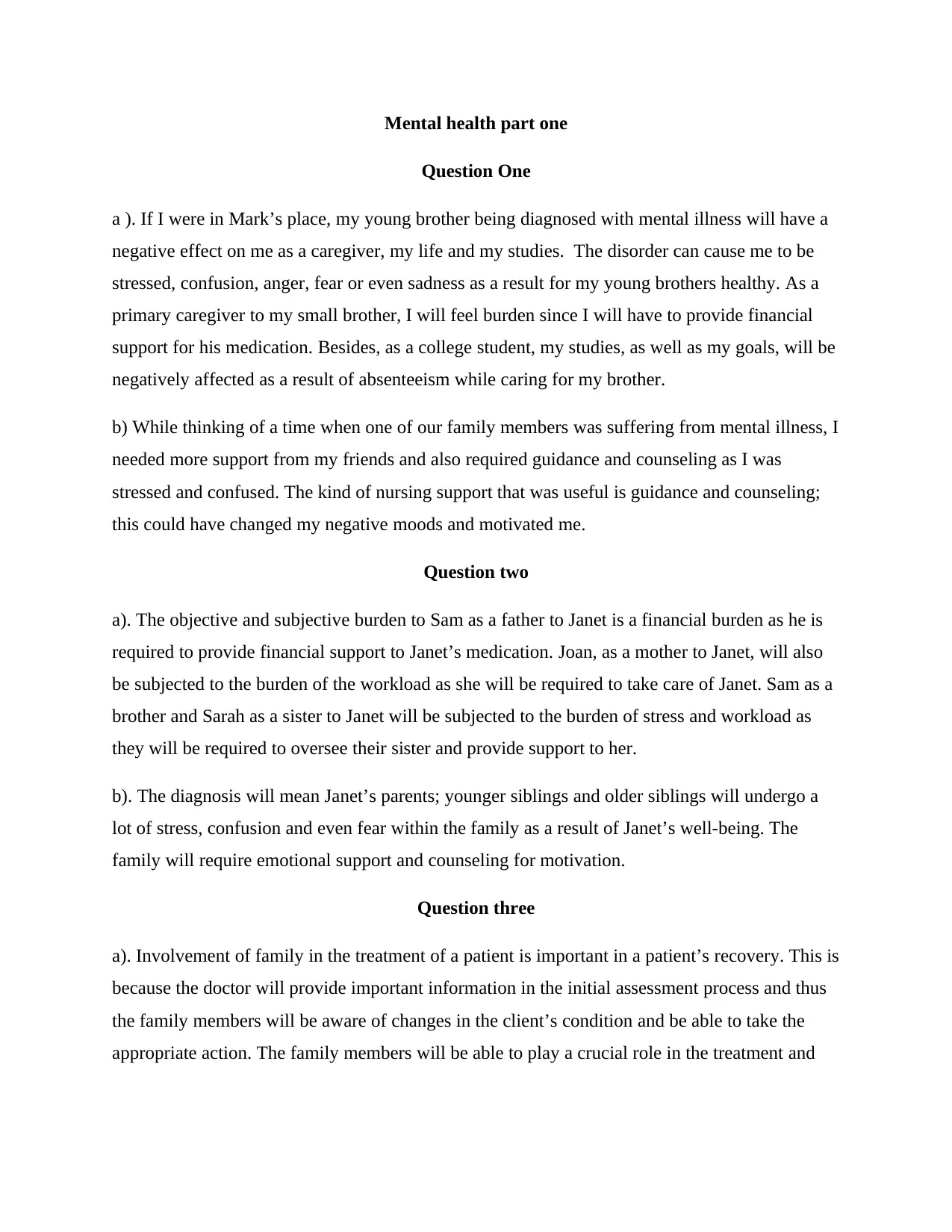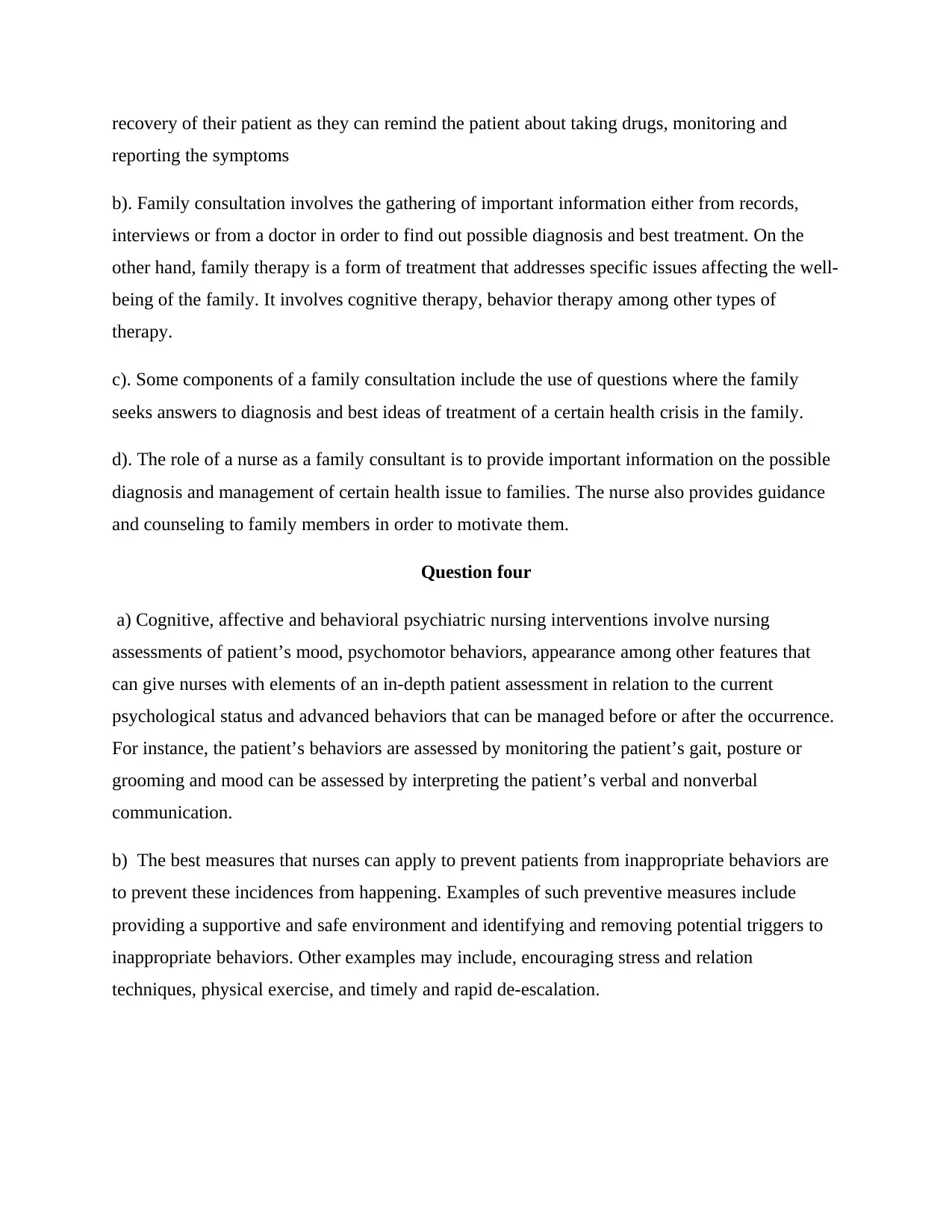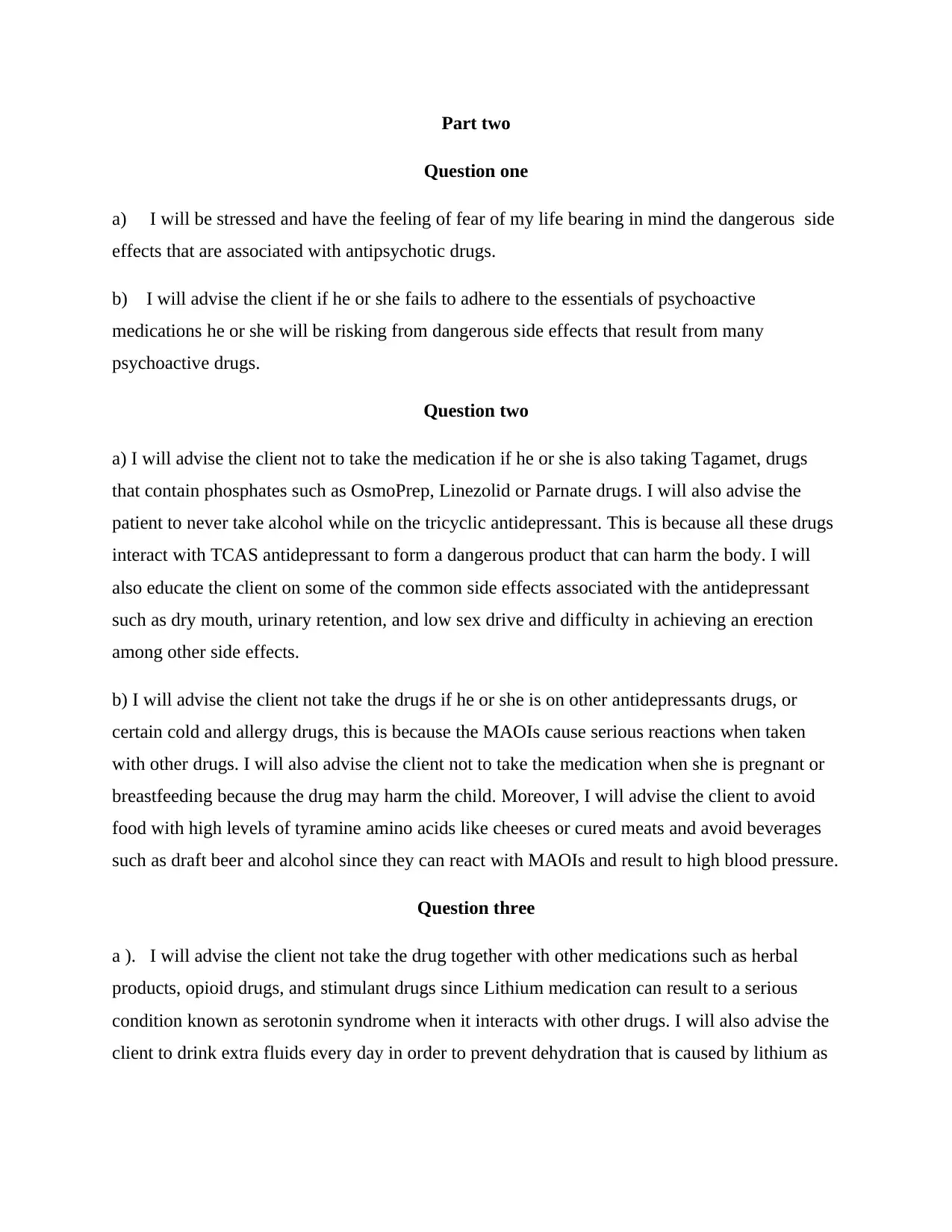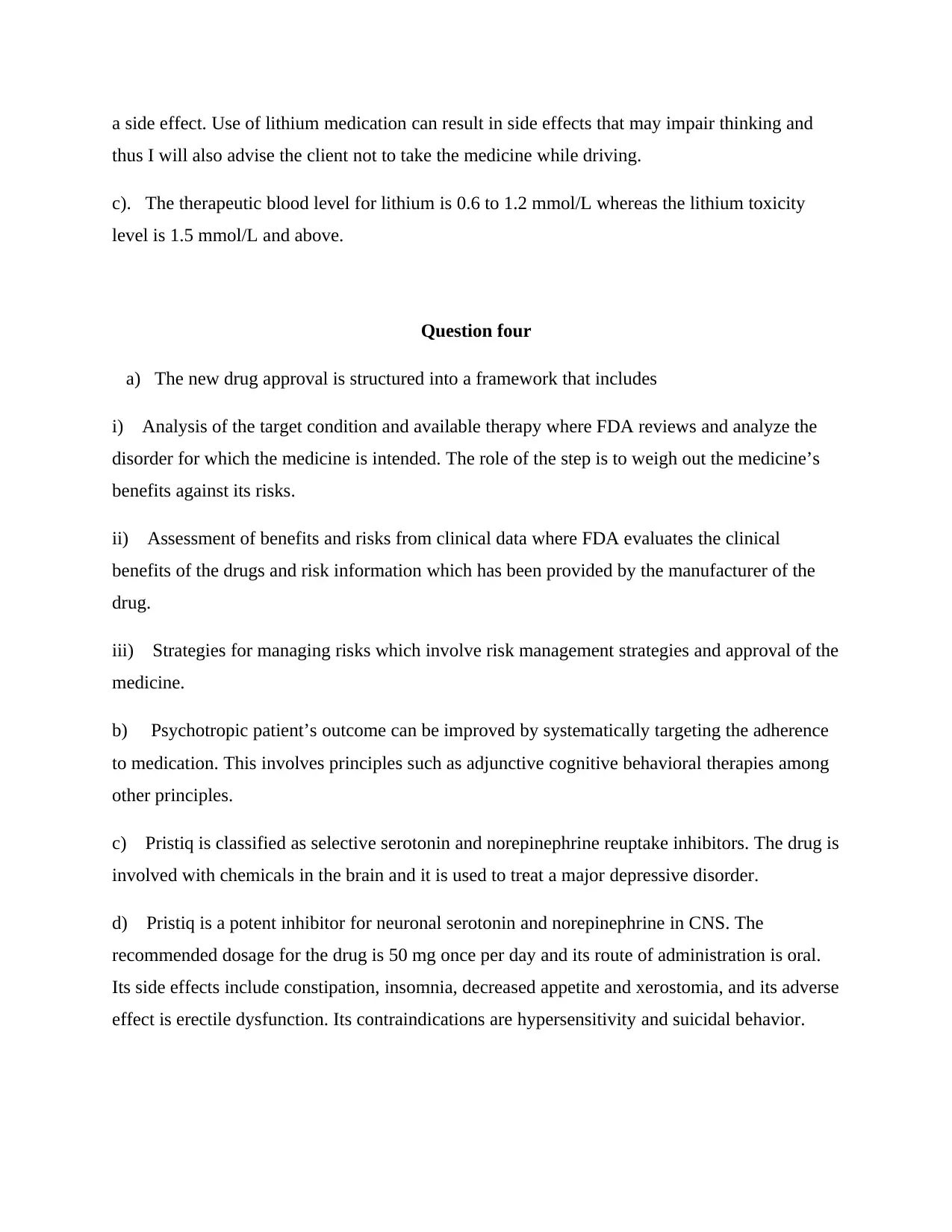Families, Interventions, & Psychopharmacology in Mental Health
VerifiedAdded on 2023/06/04
|4
|1403
|195
Homework Assignment
AI Summary
This assignment delves into critical aspects of mental health nursing, focusing on family interventions and psychopharmacology. It addresses the impact of mental illness on families, exploring the emotional, financial, and practical burdens experienced by caregivers and family members. The importance of nursing support, including guidance and counseling, is highlighted. Furthermore, the assignment discusses the significance of family involvement in patient treatment and differentiates between family consultation and therapy. It examines cognitive, affective, and behavioral psychiatric nursing interventions, emphasizing preventive measures for managing inappropriate patient behaviors. The assignment also explores the use of antipsychotic, antidepressant, and lithium medications, including client education on potential side effects and interactions. Finally, it touches on the drug approval process, strategies for improving medication adherence, and specific details about the drug Pristiq, including its classification, dosage, and side effects. This detailed analysis provides a comprehensive overview of essential concepts in mental health nursing.

Mental health part one
Question One
a ). If I were in Mark’s place, my young brother being diagnosed with mental illness will have a
negative effect on me as a caregiver, my life and my studies. The disorder can cause me to be
stressed, confusion, anger, fear or even sadness as a result for my young brothers healthy. As a
primary caregiver to my small brother, I will feel burden since I will have to provide financial
support for his medication. Besides, as a college student, my studies, as well as my goals, will be
negatively affected as a result of absenteeism while caring for my brother.
b) While thinking of a time when one of our family members was suffering from mental illness, I
needed more support from my friends and also required guidance and counseling as I was
stressed and confused. The kind of nursing support that was useful is guidance and counseling;
this could have changed my negative moods and motivated me.
Question two
a). The objective and subjective burden to Sam as a father to Janet is a financial burden as he is
required to provide financial support to Janet’s medication. Joan, as a mother to Janet, will also
be subjected to the burden of the workload as she will be required to take care of Janet. Sam as a
brother and Sarah as a sister to Janet will be subjected to the burden of stress and workload as
they will be required to oversee their sister and provide support to her.
b). The diagnosis will mean Janet’s parents; younger siblings and older siblings will undergo a
lot of stress, confusion and even fear within the family as a result of Janet’s well-being. The
family will require emotional support and counseling for motivation.
Question three
a). Involvement of family in the treatment of a patient is important in a patient’s recovery. This is
because the doctor will provide important information in the initial assessment process and thus
the family members will be aware of changes in the client’s condition and be able to take the
appropriate action. The family members will be able to play a crucial role in the treatment and
Question One
a ). If I were in Mark’s place, my young brother being diagnosed with mental illness will have a
negative effect on me as a caregiver, my life and my studies. The disorder can cause me to be
stressed, confusion, anger, fear or even sadness as a result for my young brothers healthy. As a
primary caregiver to my small brother, I will feel burden since I will have to provide financial
support for his medication. Besides, as a college student, my studies, as well as my goals, will be
negatively affected as a result of absenteeism while caring for my brother.
b) While thinking of a time when one of our family members was suffering from mental illness, I
needed more support from my friends and also required guidance and counseling as I was
stressed and confused. The kind of nursing support that was useful is guidance and counseling;
this could have changed my negative moods and motivated me.
Question two
a). The objective and subjective burden to Sam as a father to Janet is a financial burden as he is
required to provide financial support to Janet’s medication. Joan, as a mother to Janet, will also
be subjected to the burden of the workload as she will be required to take care of Janet. Sam as a
brother and Sarah as a sister to Janet will be subjected to the burden of stress and workload as
they will be required to oversee their sister and provide support to her.
b). The diagnosis will mean Janet’s parents; younger siblings and older siblings will undergo a
lot of stress, confusion and even fear within the family as a result of Janet’s well-being. The
family will require emotional support and counseling for motivation.
Question three
a). Involvement of family in the treatment of a patient is important in a patient’s recovery. This is
because the doctor will provide important information in the initial assessment process and thus
the family members will be aware of changes in the client’s condition and be able to take the
appropriate action. The family members will be able to play a crucial role in the treatment and
Paraphrase This Document
Need a fresh take? Get an instant paraphrase of this document with our AI Paraphraser

recovery of their patient as they can remind the patient about taking drugs, monitoring and
reporting the symptoms
b). Family consultation involves the gathering of important information either from records,
interviews or from a doctor in order to find out possible diagnosis and best treatment. On the
other hand, family therapy is a form of treatment that addresses specific issues affecting the well-
being of the family. It involves cognitive therapy, behavior therapy among other types of
therapy.
c). Some components of a family consultation include the use of questions where the family
seeks answers to diagnosis and best ideas of treatment of a certain health crisis in the family.
d). The role of a nurse as a family consultant is to provide important information on the possible
diagnosis and management of certain health issue to families. The nurse also provides guidance
and counseling to family members in order to motivate them.
Question four
a) Cognitive, affective and behavioral psychiatric nursing interventions involve nursing
assessments of patient’s mood, psychomotor behaviors, appearance among other features that
can give nurses with elements of an in-depth patient assessment in relation to the current
psychological status and advanced behaviors that can be managed before or after the occurrence.
For instance, the patient’s behaviors are assessed by monitoring the patient’s gait, posture or
grooming and mood can be assessed by interpreting the patient’s verbal and nonverbal
communication.
b) The best measures that nurses can apply to prevent patients from inappropriate behaviors are
to prevent these incidences from happening. Examples of such preventive measures include
providing a supportive and safe environment and identifying and removing potential triggers to
inappropriate behaviors. Other examples may include, encouraging stress and relation
techniques, physical exercise, and timely and rapid de-escalation.
reporting the symptoms
b). Family consultation involves the gathering of important information either from records,
interviews or from a doctor in order to find out possible diagnosis and best treatment. On the
other hand, family therapy is a form of treatment that addresses specific issues affecting the well-
being of the family. It involves cognitive therapy, behavior therapy among other types of
therapy.
c). Some components of a family consultation include the use of questions where the family
seeks answers to diagnosis and best ideas of treatment of a certain health crisis in the family.
d). The role of a nurse as a family consultant is to provide important information on the possible
diagnosis and management of certain health issue to families. The nurse also provides guidance
and counseling to family members in order to motivate them.
Question four
a) Cognitive, affective and behavioral psychiatric nursing interventions involve nursing
assessments of patient’s mood, psychomotor behaviors, appearance among other features that
can give nurses with elements of an in-depth patient assessment in relation to the current
psychological status and advanced behaviors that can be managed before or after the occurrence.
For instance, the patient’s behaviors are assessed by monitoring the patient’s gait, posture or
grooming and mood can be assessed by interpreting the patient’s verbal and nonverbal
communication.
b) The best measures that nurses can apply to prevent patients from inappropriate behaviors are
to prevent these incidences from happening. Examples of such preventive measures include
providing a supportive and safe environment and identifying and removing potential triggers to
inappropriate behaviors. Other examples may include, encouraging stress and relation
techniques, physical exercise, and timely and rapid de-escalation.

Part two
Question one
a) I will be stressed and have the feeling of fear of my life bearing in mind the dangerous side
effects that are associated with antipsychotic drugs.
b) I will advise the client if he or she fails to adhere to the essentials of psychoactive
medications he or she will be risking from dangerous side effects that result from many
psychoactive drugs.
Question two
a) I will advise the client not to take the medication if he or she is also taking Tagamet, drugs
that contain phosphates such as OsmoPrep, Linezolid or Parnate drugs. I will also advise the
patient to never take alcohol while on the tricyclic antidepressant. This is because all these drugs
interact with TCAS antidepressant to form a dangerous product that can harm the body. I will
also educate the client on some of the common side effects associated with the antidepressant
such as dry mouth, urinary retention, and low sex drive and difficulty in achieving an erection
among other side effects.
b) I will advise the client not take the drugs if he or she is on other antidepressants drugs, or
certain cold and allergy drugs, this is because the MAOIs cause serious reactions when taken
with other drugs. I will also advise the client not to take the medication when she is pregnant or
breastfeeding because the drug may harm the child. Moreover, I will advise the client to avoid
food with high levels of tyramine amino acids like cheeses or cured meats and avoid beverages
such as draft beer and alcohol since they can react with MAOIs and result to high blood pressure.
Question three
a ). I will advise the client not take the drug together with other medications such as herbal
products, opioid drugs, and stimulant drugs since Lithium medication can result to a serious
condition known as serotonin syndrome when it interacts with other drugs. I will also advise the
client to drink extra fluids every day in order to prevent dehydration that is caused by lithium as
Question one
a) I will be stressed and have the feeling of fear of my life bearing in mind the dangerous side
effects that are associated with antipsychotic drugs.
b) I will advise the client if he or she fails to adhere to the essentials of psychoactive
medications he or she will be risking from dangerous side effects that result from many
psychoactive drugs.
Question two
a) I will advise the client not to take the medication if he or she is also taking Tagamet, drugs
that contain phosphates such as OsmoPrep, Linezolid or Parnate drugs. I will also advise the
patient to never take alcohol while on the tricyclic antidepressant. This is because all these drugs
interact with TCAS antidepressant to form a dangerous product that can harm the body. I will
also educate the client on some of the common side effects associated with the antidepressant
such as dry mouth, urinary retention, and low sex drive and difficulty in achieving an erection
among other side effects.
b) I will advise the client not take the drugs if he or she is on other antidepressants drugs, or
certain cold and allergy drugs, this is because the MAOIs cause serious reactions when taken
with other drugs. I will also advise the client not to take the medication when she is pregnant or
breastfeeding because the drug may harm the child. Moreover, I will advise the client to avoid
food with high levels of tyramine amino acids like cheeses or cured meats and avoid beverages
such as draft beer and alcohol since they can react with MAOIs and result to high blood pressure.
Question three
a ). I will advise the client not take the drug together with other medications such as herbal
products, opioid drugs, and stimulant drugs since Lithium medication can result to a serious
condition known as serotonin syndrome when it interacts with other drugs. I will also advise the
client to drink extra fluids every day in order to prevent dehydration that is caused by lithium as
⊘ This is a preview!⊘
Do you want full access?
Subscribe today to unlock all pages.

Trusted by 1+ million students worldwide

a side effect. Use of lithium medication can result in side effects that may impair thinking and
thus I will also advise the client not to take the medicine while driving.
c). The therapeutic blood level for lithium is 0.6 to 1.2 mmol/L whereas the lithium toxicity
level is 1.5 mmol/L and above.
Question four
a) The new drug approval is structured into a framework that includes
i) Analysis of the target condition and available therapy where FDA reviews and analyze the
disorder for which the medicine is intended. The role of the step is to weigh out the medicine’s
benefits against its risks.
ii) Assessment of benefits and risks from clinical data where FDA evaluates the clinical
benefits of the drugs and risk information which has been provided by the manufacturer of the
drug.
iii) Strategies for managing risks which involve risk management strategies and approval of the
medicine.
b) Psychotropic patient’s outcome can be improved by systematically targeting the adherence
to medication. This involves principles such as adjunctive cognitive behavioral therapies among
other principles.
c) Pristiq is classified as selective serotonin and norepinephrine reuptake inhibitors. The drug is
involved with chemicals in the brain and it is used to treat a major depressive disorder.
d) Pristiq is a potent inhibitor for neuronal serotonin and norepinephrine in CNS. The
recommended dosage for the drug is 50 mg once per day and its route of administration is oral.
Its side effects include constipation, insomnia, decreased appetite and xerostomia, and its adverse
effect is erectile dysfunction. Its contraindications are hypersensitivity and suicidal behavior.
thus I will also advise the client not to take the medicine while driving.
c). The therapeutic blood level for lithium is 0.6 to 1.2 mmol/L whereas the lithium toxicity
level is 1.5 mmol/L and above.
Question four
a) The new drug approval is structured into a framework that includes
i) Analysis of the target condition and available therapy where FDA reviews and analyze the
disorder for which the medicine is intended. The role of the step is to weigh out the medicine’s
benefits against its risks.
ii) Assessment of benefits and risks from clinical data where FDA evaluates the clinical
benefits of the drugs and risk information which has been provided by the manufacturer of the
drug.
iii) Strategies for managing risks which involve risk management strategies and approval of the
medicine.
b) Psychotropic patient’s outcome can be improved by systematically targeting the adherence
to medication. This involves principles such as adjunctive cognitive behavioral therapies among
other principles.
c) Pristiq is classified as selective serotonin and norepinephrine reuptake inhibitors. The drug is
involved with chemicals in the brain and it is used to treat a major depressive disorder.
d) Pristiq is a potent inhibitor for neuronal serotonin and norepinephrine in CNS. The
recommended dosage for the drug is 50 mg once per day and its route of administration is oral.
Its side effects include constipation, insomnia, decreased appetite and xerostomia, and its adverse
effect is erectile dysfunction. Its contraindications are hypersensitivity and suicidal behavior.
1 out of 4
Your All-in-One AI-Powered Toolkit for Academic Success.
+13062052269
info@desklib.com
Available 24*7 on WhatsApp / Email
![[object Object]](/_next/static/media/star-bottom.7253800d.svg)
Unlock your academic potential
Copyright © 2020–2026 A2Z Services. All Rights Reserved. Developed and managed by ZUCOL.